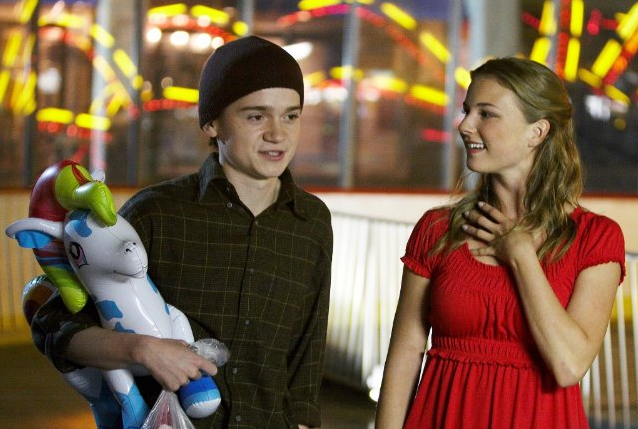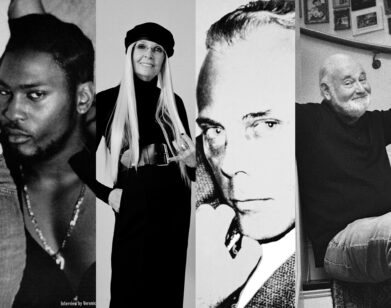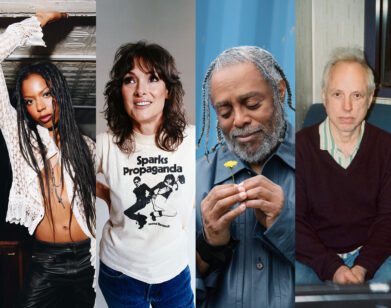Dan Byrd’s Norman Invasion

DAN BYRD WITH EMILY VANCAMP IN NORMAN.
Though he’s now probably best known for his comedy skills, after starring on TV shows Aliens in America and Cougar Town and last year’s surprise hit Easy A opposite Emma Stone, actor Dan Byrd is equally practiced in drama. Though he’s just 25, Byrd’s career already spans a dozen years, including comedies, dramas, horror fare like Mortuary and The Hills Have Eyes, and tons of TV. For an actor who’s already racked up so much experience—and currently has a plum role on one of TV’s best comedies—it’s strange to talk about a “breakthrough” performance, but Byrd’s striking lead performance in the new drama Norman could be just that.
Byrd plays the title role in Norman, a film about a young man, attempting to deal with the death of his mother and his father’s terminal illness, who comes up with an unusual coping mechanism: pretending he himself is the one with cancer. As the lie spirals out of control, it wreaks havoc on those closest to Norman—including his father, new girlfriend, and teacher, played in lovely turns by Richard Jenkins, Emily VanCamp, and Adam Greenberg, respectively.
We talked to Byrd about acting opposite Oscar-nominated Richard Jenkins, his own biggest lie, and whether Cougar Town‘s name should be changed.
ALEXANDRIA SYMONDS: It seems like cancer is having a moment right now. [Byrd laughs] Have you seen any of the other big cancer projects that have come out, 50/50 or the The Big C?
DAN BYRD: You know what, I haven’t seen either of those. I’ve been really wanting to see 50/50, and I hear really good things about from people who have seen it. It’s sort of ironic that we’re right on top of each other like this.
SYMONDS: Yeah, if you ever bump into Joseph Gordon-Levitt—
BYRD: [laughs] He wouldn’t know who I was. I don’t think this movie is big enough to create any type of rivalry.
SYMONDS: I wouldn’t underestimate it.
BYRD: Oh, well, that’s sweet. I think it’s such a big thing that affects so many people, and has so many ripple effects and so many lives… there’s room for ten of these movies to come out in a year. It’s something that affects everyone differently and inspires so many stories. So I have nothing but love for all my fellow cancer movie people.
SYMONDS: How did you first get involved in this project?
BYRD: It’s been a bit of a journey, for lack of a better word. The movie was actually made a little over three years ago, actually. And I was cast in it a year before that. I think I was the first one, and then Emily was cast. And shortly thereafter, this pilot I had done got picked up, and I thought, “Oh no, this probably means that I’ll miss out on this opportunity.” But John was nice enough to sort of press the pause button and wait until the show I was on got canceled.
SYMONDS: [laughs] Awww.
BYRD: Well, it was sad, but—
SYMONDS: It’s the definition of the closing-door, opening-window thing.
BYRD: Right, exactly. So he was nice enough to wait, and once that was over, things started rolling again and it happened. I feel that’s a pretty rare thing. Usually when things get put on hold, they never come to fruition, really. Because the funding falls through, or another actor has scheduling issues. There’s always reasons for it to get continually pushed and pushed. But he managed to get it back on track and it all happened like it was supposed to happen. So I’m very grateful that he waited for me.
SYMONDS: Was Norman a hard character to get in touch with? I mean, he’s really bitter and depressed when the film starts, at least.
BYRD: Yeah, well. It wasn’t like this happy-go-lucky experience, shooting this movie. It was something I kind of had to, sort of dedicate a certain level of focus and energy to kind of just stay in this headspace that would allow me to access—because it’s also a very emotional movie at times—access these emotions when I needed to. And you know, this was the first time I ever played a real character, a fully fleshed out, dimensionalized, multi-faceted character, as opposed to a part. There’s not very much opportunity for somebody of my age and my look, so for a character-driven piece like this to come along is a rare thing. So I just tried to as much homework as possible beforehand, and try to be like a real actor and develop a whole back story and kind of plot out an emotional arc and evolution as to where we started and where I wanted to end up. We only had 21 shooting days, so it was just like being shot out of a cannon.
SYMONDS: Wow, that must have been incredible.
BYRD: Yeah, that’s even more the reason you have to do all this groundwork beforehand, because there’s not really time to sort of find it on the day, you have to kind of just know exactly what you’re doing. And then the fact that the movie’s called Norman and I play Norman was just a weighted responsibility that I never experienced before. I just tried to be prepared as possible. And, you know, I think that’s really the only way to go about it, from what I heard from people who have to do this a lot.
SYMONDS: You and Richard Jenkins have such a realistic relationship in the movie. You can tell his father exasperates Norman, but they love each other very much. Did you guys do a lot of pre-work together, to get that dynamic?
BYRD: Yeah, a lot of things just, thank God, fell into place that didn’t necessarily have to fall into place, and that was definitely one of them. It was interesting because we were into two weeks of shooting, out of a four-week shooting schedule, and we still didn’t even have the dad cast at this point.
SYMONDS: I would never have guessed that. That’s crazy.
BYRD: Right. We had gone through so many names of people like, you know, kind of respected character-actor types. And Richard Jenkins was a name I think we both had considered early, but this was when The Visitor had just come out, and he all of a sudden had all this attention and hype around him, and I think we both just sort of thought, “Well, it’s not going to happen, especially now, at this time, when people are throwing all these opportunities at him. He’s not going to do something like this.”
But, lo and behold, they got him the script and he liked it and he did it for that reason alone, just because he liked it. And I was sort of blown away, to be honest. And it gave the movie this whole layer of credibility now, that it didn’t have before, which was important for the movie. And as an actor, just working with someone as seasoned and professional and kind as him, it’s always a learning experience watching him—on camera and off camera, just soaking it all up.
He could have gotten away with anything, especially on this set of a small movie. I think [with] a lot of older actors, it’s easy to sort of develop a cynical, jaded outlook on the whole process of making a movie. And especially a small one like this, it’s kind of easy for someone in his position to impose their will on everyone around them, and people kind of just have to deal with it. He came in and just blended right into the fabric of what was already happening, and never made a fuss about anything, was just there to contribute and to help. He’s a class act, he’s exactly what I would aspire to be at his age. To be able to see that firsthand and to work with him on screen was a really cool, gratifying experience. The one story I kind of like to tell about him is he made me cry in a rehearsal once.
SYMONDS: Oh, my God.
BYRD: Just because of what he was doing was so tragic and so real – and granted, I was already in this emotional headspace all the time. But I was definitely not intending on getting emotional in the rehearsal, of all things. But it was just kind of, because of what he was doing, it literally just came out of me. And I never, never had that happen before. Just watching an actor in front you really provokes you in such a sudden, unexpected way. You can’t ask for anything more from someone you’re working with than that.
SYMONDS: Is it weird for you to play a high school student?
BYRD: If someone were to offer me, I can’t do it anymore. When we shot this movie, I was 22, and when I was cast, I was 21. I was still much closer to that time in my life and still felt like I could relate and draw on certain things and experiences. But I think at this point I’ve kind of moved on to a new chapter and it’s just not as relevant for me anymore. But I think I could imagine what kids were going through, and since Norman wasn’t committed to going through it to begin with, it was sort of easy to play off that type of energy.
SYMONDS: What was the biggest lie you told at Norman’s age? I’m going to guess it’s not as big as his.
BYRD: I wasn’t much of a liar. When I was in high school, my parents had this power over me—if I ever lied or got caught doing something that I shouldn’t be doing, then I would no longer be able to go to LA and continue to pursue the acting thing. So that was this sort of looming thing they could had over me that just sort of really kept me in check throughout those formative years where you would typically be lying and doing bad stuff. Not that I wasn’t doing all kinds of bad stuff, but it was good not having to lie about it.
Honestly, the only lie I really remember from my adolescence was when I was in sixth grade and I was dropped off with a couple of friends at the movie theater to go see a movie, I can’t remember which one it was, and we went to go see this movie instead that was rated R. And we were picked up by my mom, and she was asking us how the movie was that she thought we saw. And we were trying to cobble together some story or lie about it, and it became obvious we were lying, and then eventually she found out and I got in trouble for that. That was sort of a defining moment, that was probably the first time I had ever lied to my parents about something. And granted, I was much younger, I wasn’t high-school age. I was 11 or 12 or something. But that was a really traumatic experience; I tried to shy away from the lying to them as much as possible afterwards.
SYMONDS: I’m sorry to make you dredge that up.
BYRD: I know, now I’m going to have to go sit in a dark room and contemplate.
SYMONDS: But I think your life is probably back to the funny stuff now, right? You’re filming Cougar Town again?
BYRD: Um, yes, yes. We’re filming again. I think we’re about nine episodes in.
SYMONDS: I’ve read blog posts and things about how it would be appropriate for Cougar Town to change its name. Where do you come down on that?
BYRD: Yeah, this is something we’ve all been discussing since the end of season one. I don’t know, there’s definitely two sides to that coin. I think the name isn’t relevant anymore to what the show is, but also now we’re in our third season and that’s the name that people recognized and it’s part of the identity of the show, whether we like or not.
SYMONDS: Do you think Travistown would be a better name?
BYRD: [laughs] Trust me, I’ve pitched it plenty of times, and it doesn’t seem to be gaining much traction.
NORMAN IS OUT IN LIMITED RELEASE TODAY.






